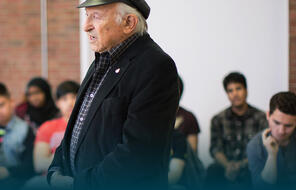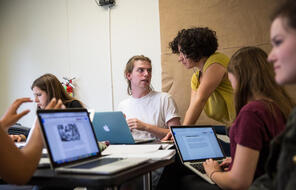1116 Results
The Holocaust
Americans and the Holocaust: The Refugee Crisis
Explore the motives, pressures, and fears that shaped Americans’ responses to Nazism and the humanitarian refugee crisis it provoked during the 1930s and 1940s.

Teaching the Holocaust and Armenian Genocide: For California Educators
Designed for California 10th grade world history courses, this unit guides students through a study of the Holocaust and the Armenian Genocide that focuses on choices and human behavior.

Teaching Who Will Write Our History
Invite students to reflect on why it matters who tells our stories as they view a documentary film about the profound courage and resistance of the Oyneg Shabes in the Warsaw ghetto.

For Educators in Jewish Settings: Teaching Holocaust and Human Behavior
Developed specifically for educators in Jewish settings, these lessons lead middle and high school students through an examination of the Holocaust from a historical perspective and consider what this particular history has to do with what it means to be Jewish.

Teaching Holocaust and Human Behaviour (UK)
Lead your students through a detailed and challenging study of the Holocaust that asks what this history can teach us about the power and impact of choices.

Spanish Translations from Holocaust and Human Behavior
Get Spanish-language versions of popular readings from Holocaust and Human Behavior.

Teaching Holocaust and Human Behavior
Use this 23-lesson unit to lead middle or high school students through a study of the Holocaust that asks what this history can teach us about the power and impact of choices.

Holocaust and Human Behavior
Explore the digital version of our core resource on the Holocaust. Find classroom-ready readings, primary sources, and short documentary films that support a study of the Holocaust through the lens of human behavior.

Teaching with Testimony
Engage students in personal accounts from survivors with this collection of video testimony, survivor profiles, and a lesson plan.

Survivors and Witnesses: Video Testimony
This collection features powerful accounts of the Holocaust, told by survivors, rescuers, and witnesses, selected from USC Shoah Foundation’s Visual History Archive.

Recommended Resources for Holocaust and Human Behavior
Find videos, lessons, and additional resources that build on the themes explored in Holocaust and Human Behavior.


